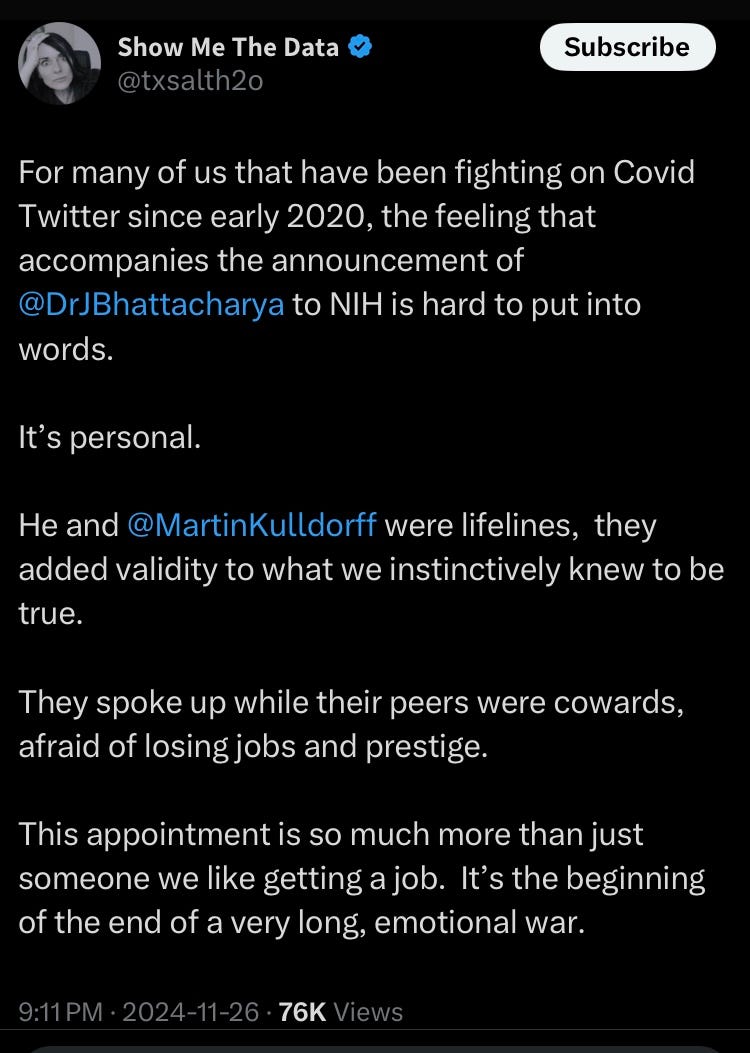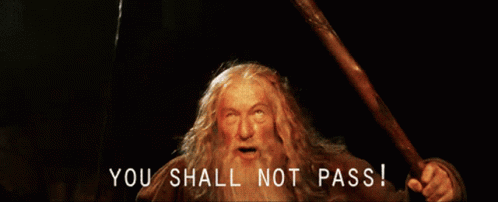Nature is healing.
It’s healing, and more: the ordeals of recent years have left many of us stronger. Not stronger in terms of conventional markers, mind you; indicators of material well-being have all tanked alarmingly, especially in Canada.
I mean in terms of spiritual stamina.
Individually, collectively, these past four years showed us muscles we’d rarely used, because we hadn’t needed them. In the past four years, we confronted assaults against our privacy, autonomy, our perception of reality; and that experience shocked us into finding our spiritual cores. We ended up working them for dear life and ultimately, using them to hold the line.
Consider a prominent example. On November 26, 2024, Professor Jay Bhattacharya— a foremost dissident of the COVID era, co-author of the Great Barrington Declaration—was declared President Donald J. Trump’s nominee to serve as director of the National Institutes of Health (NIH).
Of the NIH, no less—the research arm of that once-storied cluster of federal health agencies that turned on its own population. Come January, 2025, Dr. Bhattacharya will report to Robert F. Kennedy, Jr., nominee as the new Director of the United States Department of Health and Human Services. Prior to the COVID era, RFK Jr. himself spent decades in the political wilderness for his health policy stances, which did not align with public health dictates. The MAHA movement joining with MAGA are yet another sign: nature is healing.
The NIH may have been the preeminent propagandist of the COVID era. Besides funding the gain of function research that likely led to the virus emerging, it beamed out relentless messaging demanding compliance on masks, vaccines, and lock downs. Early in the period, the same NIH served as the perch from which Drs. Francis Collins and Anthony Fauci exchanged emails orchestrating the “quick and devastating public take down” of the Great Barrington Declaration and its three authors.
For his part, Dr. Bhattacharya had broken ranks with The Science™ as early as March 2020, when he questioned COVID’s deadliness and predicted that lockdowns would have devastating effects, especially for the poor. He followed with an April 2020 study showing that COVID infection rates were much higher in his own northern California county than believed—hence, its mortality was much lower. Alex Berenson offers details on the personal attacks that followed.
But Dr. Bhattacharya kept going. When he could no longer get a hearing through official channels, the Stanford professor took to Twitter. On podcasts and alternative media, he made his case. He appeared as an expert in an Alberta court. He was a co-plaintiff in Missouri v. Biden, arguing that the United States government had violated his First Amendment rights by ensuring his censorship on Twitter.
Dr. Jay Bhattacharya fought the best of possible fights, in other words. His Tuesday-night nomination to the NIH brought an outpouring of relief—from @txsalth20, for example, another dissector of The Science™ in that period:
His example bears recalling for our second set of resistance training.
“Tips and theories of non-violent resistance for our distracted times.”
This post returns us to a central purpose of The Good Resist. Readers have been patient as theories unspooled, but the point is to know how to live. To that end, the tips have returned. As with the first post back in April, this one will offer a set after wrapping up the main lessons of past few posts into a tidy(ish) package.
The tips here add on to those that appeared in the first resistance training set. The focus this time will be on developing that spiritual core—the same we will need as we clear away our small corners of the mess we now find ourselves in.
Signs of strength
The recent election in the United States signified a collective rejection of the incumbent as much as an embrace of Donald Trump’s populism. Delivering the first Republic popular majority since 2004, the win marked a refreshing return to politics uniting disparate figures, groups, and voters behind a common purpose.
Beleaguered Canadians may look wistfully across the border as one non-confidence motion after another fails in our long Liberal winter. We can take consolation in dismal polling numbers of our incumbent. More than that, though, a reserve of core strength continues to build—inspired by that acknowledged model to the world, the Freedom Convoy.
Exhibit A: “As tenure burns...” Back in May, nine Canadian professors published an open letter in support of their colleague, Patrick Provost. A biochemist with expertise in key components of the COVID shots, Professor Provost had full tenure, yet was still fired from his university. The professors decried the “astonishing rise in censorship” within and beyond the academy, offering the “bold speech and consistent action” of Professor Provost as a model. The letter’s authors might serve as a model too.
Further demonstrations appeared in a June post on events in Western Canada. Hearings of the National Citizens Inquiry in Regina and a full-length conference in Red Deer were followed by a United Conservative Party event in Calgary, “An Injection of Truth.” For the first time, Canadian doctors critical of COVID measures had been brought together with provincial politicians. Relief in the room was palpable, undeterred by the usual ridicule of figures from the Canadian press.
Beyond such events have been the Substacks and podcasts: the incomparable Alex Brown, also of Canada’s National Citizens Coalition, with his weekly diagnoses and pep talks urging us not to lose heart. Gord Magill of Autonomous Truck(er)s keeps us apprised of the remaining Coutts Two, even connecting us to conversations from jail. In them we see first-hand the courage and decency of regular men—ones who are now attempting to find the silver lining in a bizarre six-year sentence they received despite a jury’s not-guilty verdict.
The strongest spiritual cores in the country may sit in a Drumheller federal prison.
Another Substack of note: The Bureau. Sam Cooper, the source of almost all our knowledge of the capture of specific Canadian leaders and institutions by the Chinese Communist Party, is surely one of the bravest investigative journalists. “Here comes the sun again,” a post from June, addresses the complex of issues he was instrumental in bringing into public view. The post also indicates the larger public purpose of any fortitude we cultivate as individuals:
Those rays of sunlight that made it through the crack in the Prime Minister’s Office door revealed something horrifying: the prospect that hostile foreign powers could already be steering our government.
And in face of that horror, it’s tempting to crumple—to say it’s over, we’re doomed. To turn away and tune out and let what emerged slip back into the darkness. That’s the danger.
But then they’ve got us.
With spiritual stamina, we can face what Cooper’s investigations have turned up—the same that the PMO wants to slip back into the darkness. With it, we can insist on the transparency that our sovereignty and way of life depend on.
Handle history with care
Prior posts also addressed what not to do to build spiritual stamina. It may be counterintuitive, but appeals to get on “the right side of history” are not the way. A May post presents the end of history as properly an article of religious faith. Beyond that, “goal of history” talk arises from the pseudo-science of ideology.
That same post took exception to progressive views of history as inviting the coercion of people—or peoples—deemed too “backward” to appreciate the direction of history. Besides this, the declared goal of history is constantly shifting, meaning progressivism promises wave after wave of destruction in the real world:
Today in North America, the goal is commonly seen as “social justice,” embodying tenets of diversity, equity, and inclusion. But it wasn’t always. In the mid-nineteenth century, progressives in both Europe and America deemed the goal of human history to be the advance of “civilization” over “barbarism” . . . .
Present-day progressives apologize for human rights abuses committed by the progressives of prior centuries. Only much later did they understand that the historical mission to advance civilization was not merely mistaken, but even genocidal.
“Sizing up the ideologues,” the post from August, showed how justifications using history are central to all ideologies—both progressive and revolutionary. It enlists the work of political philosopher Hannah Arendt, who defined ideology as “literally what its name indicates: it is the logic of an idea.” Whether race, class, gender, or some other idea, the logic is applied to human history itself, the site of its unfolding.
Yet ideological thinking leads to irrational outcomes. The causes of “what happens” are too messy and mysterious to be reduced to one factor. The destructive effects of the unfolding logic are shown on the example of gender ideology, as applied to the women’s Olympic boxing category this past summer.
The message? Forget history, at least as a verdict on the ethics of actions. It is beautiful, poetic justice, when good wins—but “what happens” can never be the last word on morality. To take Dr. Bhattacharya as an example, was his main concern to land on “the right side of history” when he acted in March 2020? Would those actions have been less worthy if they had not set him the directorship of the NIH? Or on the other side, are the actions of those who get caught up in the moral imperatives of the latest thing excused by the trend of history?
There is an alarming moral laziness to justifying actions on historical trends. History becomes an alibi—the notion “no one could judge if they weren’t there.” The reticence to judge, in turn, denies us our agency, as Hannah Arendt pointed out in a September post on the example of Adolf Eichmann:
For behind the unwillingness to judge lurks the suspicion that no one is a free agent, and hence the doubt that anyone is responsible or could be expected to answer for what he has done (19).
And that path is diametrically opposed to acting in freedom.
Reclaiming our reason
So how to consider, justify, account for our actions?
The path is thinking, according to Arendt and political philosopher Eric Voegelin, also profiled in two posts. Thinking beyond the confines of ideology allows us to discern and reconnect with who we are.
October’s post cited Eric Voegelin, who reached back to the classic experience of ancient Greek philosophers in trying to prompt a recovery in 1960s Germany, which had not yet recovered from National Socialism. For the ancient Greeks, reason (Nous) was at once the defining feature of humanity and a process that enabled resistance:
In their acts of resistance to the disorder of the age, Socrates, Plato, and Aristotle experienced and explored the movements of a force that structured the psyche of man and enabled it to resist disorder. To this force, its movements, and the resulting structure, they gave the name Nous. As far as the ordering structure of his humanity is concerned, Aristotle charaterized man as the zoon noun echon, as the living being that possesses Nous (268).
As composite beings, humans participate in reality at four levels: organic being through our bodies, emotions through our passions, and societies through our inter-subjectivity. But reason is our centre, our ordering force. Originating in divine Nous, that capacity gives each individual access to truth.
A second post on Hannah Arendt contributed the negative example of the thoughtlessness of Adolf Eichmann. The Nazi mid-level bureaucrat was a key participant in the Final Solution, and had surrendered his capacity to think. As a result, to the end, he failed to grasp his personal role in murdering millions of Jews. Yet he was still held to account—as he ought to have been:
We are concerned here only with what you did, and not with the possible noncriminal nature of your inner life and of your motives or with the criminal potentialities of those around you (278).
When thoughtless types like Eichmann become socially dominant, the whole society becomes easy prey for an ideology. When we individually reclaim our ordering centre, by contrast, we can develop spiritual stamina.
And from there, discern how to act.
From there, we can approach history with humility—not as the unfolding of some ideology, but a field with insights and lessons from the past.
From there too we can appreciate myth. A topic of July’s post, the old gods and stories that draw at our emotions could be seen not as mere fictions or temptations, but as entailing wisdom of their own.
With reason at its core, nature—human nature—can heal and thrive.
Now for the tips
Challenge your mind and body: Enter new realms of knowledge or physical skill to draw yourself out of your status quo. Outside of more screen time, the pursuit could be anything. Learn a language, ride a horse, shoot a gun.
Practice really thinking: Use any and all occasions to think. Don’t be lulled by the algorithm. Listen to the advice of others, but not only. Do your own research. Use your own lights, rely on the evidence of your eyes and ears.
Learn from people you admire: Spend time with them and their thoughts. They could be in your personal circle or beyond it, on podcasts, in literature, wherever. Understand what motivates them, why you admire them. Exposure is the start.
Contemplate “the line” and the many ways to hold it. This is where things get interesting—fun even—because the variations are many:
The line could be a hill you’d die on
Or a bridge too far
A boundary you won’t let be breached
Or a bar you’re determined to clear
It could be an exquisite pose
Or a tradition you tend through time
Whatever your line is, it’ll be larger than you.
Discover it, reflect on it, train yourself to meet it.
Then hold that line, like your life depends on it.
Because that’s how we win this thing.













David, thanks again for the careful read.
1) yes, you are correct, and I'm tempted to change but I don't like to make substantive edits after I've published something, so I'll just let that stand clarified here. Nous exists in potentia only if/until it's actualized. I see nous as a little bit mystical, more on lines of Geist (spirit plus intellect), but that may be importing later language into it: I don't know Greek. Plus, you know Voegelin has had a big influence on me, he called them "mystic philosophers."
However, I would dispute that ideology is what we are left with when we can't perceive the way through reason. It may have been dogma or belief, but ideology has those two components that I think the former do not: its claim to be based on science, and to unfold in history. The inexorability, the infallibility, I think, is its hallmark. But you are right, Arendt makes that statement "logic of the idea" without those extra qualifiers.
Then again, is it only following the logic that allows us to navigate that dark and shifting space you refer to? Isn't it wonder as well, trust, expectation of insight? I think thinking has that component as well. And let's also not forget that I refer there to thinking about our actions, so this is not simply contemplation of divine Nous. So that brings much more than logic, also empirical observation, apprehension of effects, etc. Nous turned on the empirical world gives rise to phronesis, a whole different set of virtues. And I don't think those are inaccessible to all but practised philosophers.
2. I think that Arendt at the end was flummoxed on how to deal with Eichmann because in her view he was guilty, ie. he had done it, but also clueless as to what he had done--so the intent piece was missing. I think too of someone who murders but impaired mentally: they have to be removed from society anyway. Not sure it is thoughtlessness for an institution to insist on it.
Appreciate the optimism and directive to improve; though we see specks of light on the horizon, it remains dark and the enemy is still within the gates.